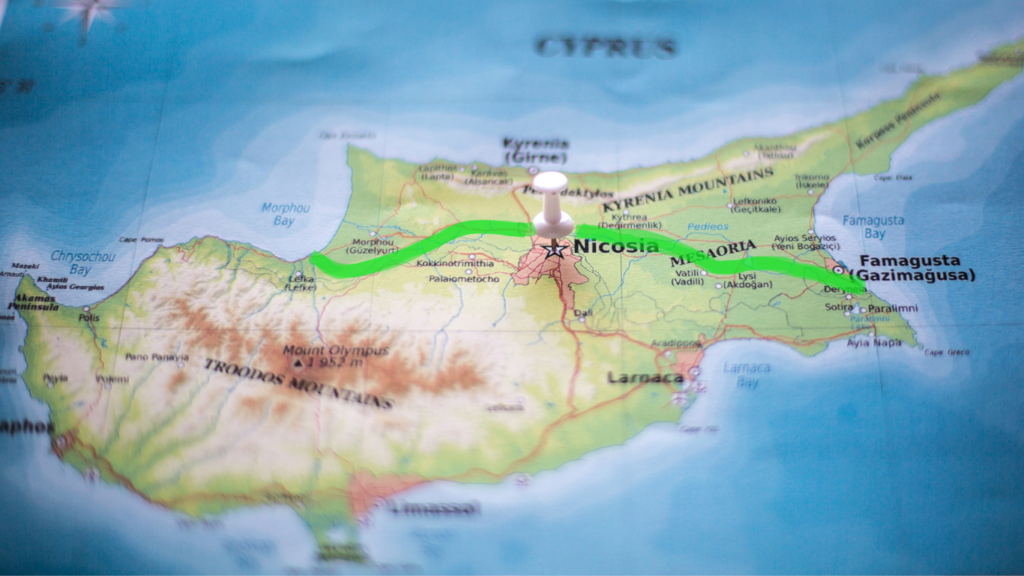Important Notes
Intended parents embarking on a surrogacy journey in Cyprus must be mindful of the island’s complex geopolitical situation. On July 20th, 1974, Turkey invaded Cyprus, leading to the division of the island into two distinct regions. This division created a unique geopolitical landscape, with the two areas separated by a secure buffer zone known as the Green Line. Understanding this historical context is essential for intended parents navigating the surrogacy process, as it may impact various aspects of their journey, including legal considerations and logistical arrangements. The two zones are:
- The Republic of Cyprus, which constitutes the southern portion, is a member of the European Union
- The Turkish Republic of Northern Cyprus (TRNC) is under the control of Turkey and lacks recognition from the European Union and the majority of countries worldwide.
Given this division, intended parents should ascertain which part of Cyprus they will be traveling to, as ONLY the southern section has legislation (Surrogacy Law of 2002).
Intended parents who inadvertently pursue treatment or arrangements in Northern Cyprus (TRNC) may face serious legal complications, particularly with respect to parentage recognition, citizenship, and travel documentation for the child.
Understanding this distinction is paramount, as it dictates the legal framework, healthcare standards, and travel regulations governing surrogacy arrangements. Therefore, thorough research and consultation with legal and medical professionals and immigration officials from your country are essential to ensure a smooth and legally compliant surrogacy process.
Surrogacy Insights
Surrogacy in Cyprus: Legal Framework, Geographic Division, and Key Risks
Surrogacy in Cyprus is often described as offering legal structure and judicial oversight. However, this is true only in part. Cyprus’s unique geopolitical division means that surrogacy is regulated solely in the southern, internationally recognized Republic of Cyprus, while the northern, Turkish-controlled region operates outside this legal framework.
Understanding this distinction is essential for intended parents considering Cyprus as a surrogacy destination.
Cyprus’s Geopolitical Division and Why It Matters
On July 20, 1974, Turkey invaded Cyprus, resulting in the island’s ongoing division into two separate jurisdictions, divided by a UN-controlled buffer zone known as the Green Line.
The two regions are:
Republic of Cyprus
Controls the southern portion of the island
Internationally recognized
Member of the European Union
The only part of Cyprus where surrogacy is regulated by law
Turkish Republic of Northern Cyprus (TRNC)
Controlled by Turkey
Recognized only by Turkey
Not subject to EU law
Has no specific surrogacy legislation
All surrogacy laws discussed below apply exclusively to the Republic of Cyprus. They DO NOT apply in Northern Cyprus.
The Legal Framework for Surrogacy in the Republic of Cyprus
Surrogacy in the Republic of Cyprus is governed by two interconnected laws:
The Surrogacy Law of 2002
The Medical Assisted Reproduction Law of 2015
Together, these laws regulate whether surrogacy is permitted, how it must be conducted, and who may participate.
The Surrogacy Law of 2002: Legal Authorization and Parentage
The Surrogacy Law of 2002 established the legal basis for gestational surrogacy in Cyprus. Its primary purpose is to provide judicial oversight and legal certainty, particularly regarding parentage.
Altruistic surrogacy only
Surrogacy must be non-commercial.No compensation may be paid to the surrogate
Only reasonable, documented pregnancy-related expenses may be reimbursed
Mandatory court approval before embryo transfer
Intended parents must apply to a Family Court before treatment begins.
The court reviews:
Medical necessity for surrogacy
The suitability of the surrogate
The written surrogacy agreement
Confirmation that no financial inducement is involved
Legal parentage by court order
When approved, the court order recognizes the intended parents as the child’s legal parents, avoiding post-birth disputes.
In summary, this law answers the fundamental question: Is surrogacy legally permitted, and who are the parents?
The Medical Assisted Reproduction Law of 2015: Medical and Ethical Regulation
The Medical Assisted Reproduction Law of 2015 modernized Cyprus’s fertility regulations and governs how surrogacy is carried out in practice.
It regulates:
Licensing and oversight of IVF clinics
Medical eligibility for assisted reproduction
Consent, counseling, and psychological screening
Ethical standards and compliance requirements
Proper storage and handling of genetic material
In practical terms:
The 2002 law provides legal authorization
The 2015 law governs medical treatment and clinic conduct
A surrogacy arrangement must comply with both laws to be valid.
Who Can Participate in Surrogacy in the Republic of Cyprus?
While each case is reviewed individually by the court, key principles include:
Surrogacy is typically permitted for individuals or couples who are medically unable to carry a pregnancy
The surrogate must meet medical and psychological suitability criteria
All parties must give informed consent
The arrangement must be altruistic, transparent, and court-approved
Failure to meet these conditions can result in denial of court approval.
Northern Cyprus (TRNC): Absence of Surrogacy Law and Associated Risks
The TRNC has no dedicated surrogacy legislation.
Key points:
There is no statutory framework authorizing surrogacy
No court process exists to approve surrogacy arrangements
No mechanism exists to issue parentage orders in favor of intended parents
Existing IVF regulations do not clearly permit surrogacy
As a result, any surrogacy-related activity in Northern Cyprus operates in a legal vacuum.
Risks for International Intended Parents in the TRNC
For international intended parents, pursuing surrogacy in Northern Cyprus carries significant risks, including:
Uncertain parentage (the birth mother may be recognized as the legal parent)
Non-recognition of documents outside Northern Cyprus
Serious difficulties in obtaining citizenship or travel documents for the child
Lack of international legal recourse due to the TRNC’s limited recognition
It should also be noted that Turkey expressly prohibits surrogacy. Under Turkish law, third-party reproduction is not permitted, including gestational or traditional surrogacy, as well as egg and sperm donation.
Participation in surrogacy-related activities may result in administrative and criminal penalties, loss of medical licenses for physicians, and legal exposure for intermediaries and agencies. While enforcement may vary, the legal prohibition itself is clear.
These risks can have significant long-term legal and immigration consequences for intended parents and children.
Conclusion
Surrogacy in Cyprus is legally regulated only in the Republic of Cyprus, under a dual framework consisting of the Surrogacy Law of 2002 and the Medical Assisted Reproduction Law of 2015. These laws provide court oversight, restrict surrogacy to altruistic arrangements, and regulate medical practice.
By contrast, Northern Cyprus has no surrogacy laws, no court protections, and no reliable path to legal parentage for intended parents.
Intended parents should proceed only with full awareness of Cyprus’s divided legal landscape, carefully confirm the jurisdiction of all clinics and professionals involved, and understand that surrogate compensation is prohibited by law. Independent legal and immigration advice should be obtained in writing, and the jurisdiction in which each aspect of the surrogacy process occurs should be verified before proceeding.

Future Legal Developments
2019 Israeli Government Warning
It cautioned Israeli citizens against engaging in surrogacy agreements in the Turkish Republic of Northern Cyprus (TRNC) due to potential legal complications and inadequate medical standards compared to those in Israel or other countries with established surrogacy regulations. This warning aimed to inform Israeli citizens about the potential risks involved in seeking surrogacy services in the TRNC and to encourage them to consider alternative options for assisted reproduction. (Read the report here.)



